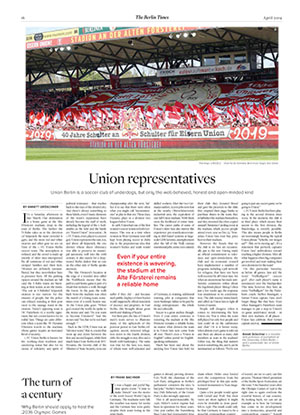Why Berlin should apply to host the 2036 Olympic Games
It was a happy and joyful big-time sports event. “A time to make friends” was the motto of the 2006 Soccer World Cup in Germany. The stadiums were full, the weather was sunny for weeks and the German fans were giddy despite their team losing in the semi-finals.
The world saw a very tolerant, empathetic country that summer, and there could soon be an opportunity for it to happen again. Berlin’s Senator for the Interior and Sport, Andreas Geisel, has proposed that Berlin apply to host the 2036 Summer Olympics – with the added symbolic significance of being one hundred years after the Nazis turned the 1936 games into an ignominious propaganda campaign.
As of yet, there are but musings, yet the potential push to host the games is already proving divisive. Udo Wolf, the chairman of the Left Party delegation in Berlin’s parliament considers the idea “a bad joke.” Berlin’s Senator for Justice, Dirk Behrendt, of the Green Party is also strongly opposed.
This is all understandable. By 1936, Hitler’s terror regime had been in operation for three years. One year earlier, the Nuremberg Race Laws had downgraded Jews to second-class citizens, and opponents of the regime were already disappearing to concentration camps. The dictator exploited the Olympic Games, which had been awarded to Germany in 1931, as a propaganda platform without equal. The largest sporting event on the planet was intended to show the world that Germany was a peace-loving, economically aspiring country. And now, a hundred years later, the idea has been floated for the Olympic Games to take place again in the very stadium where Hitler once lorded over the competition from his privileged box? In this epic architectural monument to Nazi megalomania?
Quite a few people would agree with Geisel and Wolf. But their views are short sighted. It might even be desirable to draw parallels to 1936. The result could only be that Germany is found to be a peaceful, cosmopolitan country – as the world already experienced at the Soccer World Cup in 2006. 2036 would simply be a continuation of that.
This is true, however, only under precisely the condition that history is never to be forgotten; it is imperative that the victims are remembered appropriately. It would be a fatal flaw for Germany to present itself as a country for which National Socialism is a mere historical footnote.
The decision-makers in this country and the absolute majority of society are set to carry out this process. Thomas Härtel, president of the Berlin Sport Federation, set the tone: “One hundred years after the Olympic Games of 1936 is the right date to again confront the eventful history of our country. By looking back, we can set an example as to how far Germany has come in its development into a democratic, peaceful and cosmopolitan country.” Kaweh Niroomand, a native of Iran and vice president of the German Olympic Sports Federation, has a similar argument. “1936 is a sensitive topic,” he admits. “But it is also a huge opportunity, especially at this time, to present our democratic country as an antithesis to what it was 100 years ago.
Frank Bachner
is a metro editor for the Berlin daily Der Tagesspiegel.



